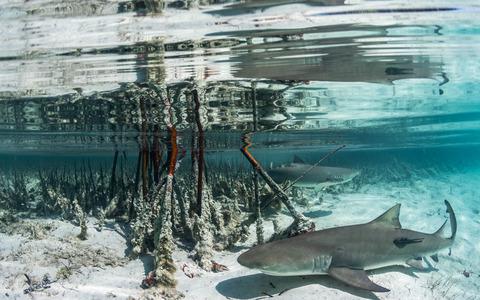当前位置:
X-MOL 学术
›
Funct. Ecol.
›
论文详情
Our official English website, www.x-mol.net, welcomes your
feedback! (Note: you will need to create a separate account there.)
Predator abundance drives the association between exploratory personality and foraging habitat risk in a wild marine meso-predator
Functional Ecology ( IF 4.6 ) Pub Date : 2021-07-02 , DOI: 10.1111/1365-2435.13874 F. Dhellemmes 1, 2, 3 , M. J. Smukall 3, 4 , T. L. Guttridge 3, 5 , J Krause 1, 2 , N. E. Hussey 6
中文翻译:

捕食者丰富度推动了野生海洋中观捕食者的探索个性与觅食栖息地风险之间的关联
更新日期:2021-09-07
Functional Ecology ( IF 4.6 ) Pub Date : 2021-07-02 , DOI: 10.1111/1365-2435.13874 F. Dhellemmes 1, 2, 3 , M. J. Smukall 3, 4 , T. L. Guttridge 3, 5 , J Krause 1, 2 , N. E. Hussey 6
Affiliation

|
- In recent years, the incorporation of lower levels of organization to the understanding of population ecology, has led to an increase in interest for animal personality and individual foraging specialization. Despite these topics investigating comparable phenomena, that is, individual consistency in behaviour and in food resource use respectively, they have rarely been investigated together.
- Food resource use is thought to be at the interface between personality and life history. More explorative individuals in a population, for example, are thought to increase encounter rates with food resources and consequently have faster growth than less explorative conspecifics.
- Such hypotheses have so far only received partial support, and the link between personality and life history is increasingly speculated to be plastic and dependent on spatio-temporal variation in ecological conditions. Intraspecific competition and/or predation risk, for example are known to influence foraging specialization.
- Here, we investigated the relationship between exploration personality of juvenile lemon sharks Negaprion brevirostris (measured in captivity) and foraging habitat use (high risk vs. low risk; measured via stable isotope analysis in the field) in relation to conspecific and predator abundance.
- We identified predator abundance as the main driver for the association between foraging habitat and exploration personality. When predators were less abundant, increased exploration was associated with foraging in riskier habitats. When predator abundance increased, an inverse relationship occurred, with less explorative individuals using more dangerous habitat.
- We conclude that the relationship between personality and resource use is plastic and context dependent, which could explain the inconclusive results of previous studies investigating links between personality and life history.
中文翻译:

捕食者丰富度推动了野生海洋中观捕食者的探索个性与觅食栖息地风险之间的关联
- 近年来,将较低级别的组织纳入对种群生态学的理解,导致对动物个性和个体觅食专业化的兴趣增加。尽管这些主题分别调查了可比较的现象,即个体在行为和食物资源使用方面的一致性,但它们很少被一起调查。
- 食物资源的使用被认为是性格和生活史之间的交汇点。例如,一个种群中更具探索性的个体被认为会增加与食物资源的相遇率,因此与较少探索性的同种个体相比,其生长速度更快。
- 迄今为止,此类假设仅得到部分支持,并且越来越多地推测个性与生活史之间的联系是可塑性的,并且取决于生态条件的时空变化。例如,已知种内竞争和/或捕食风险会影响觅食专业化。
- 在这里,我们调查了幼年柠檬鲨Negaprion brevirostris 的探索个性(在圈养中测量)和觅食栖息地使用(高风险与低风险;通过现场稳定同位素分析测量)与同种和捕食者丰度之间的关系。
- 我们确定捕食者丰富度是觅食栖息地与探索个性之间关联的主要驱动因素。当捕食者数量较少时,增加的探索与在风险较高的栖息地觅食有关。当捕食者数量增加时,就会发生相反的关系,探索性较低的个体使用更危险的栖息地。
- 我们得出结论,人格与资源使用之间的关系是可塑性和上下文相关的,这可以解释先前调查人格与生活史之间联系的研究的不确定结果。









































 京公网安备 11010802027423号
京公网安备 11010802027423号